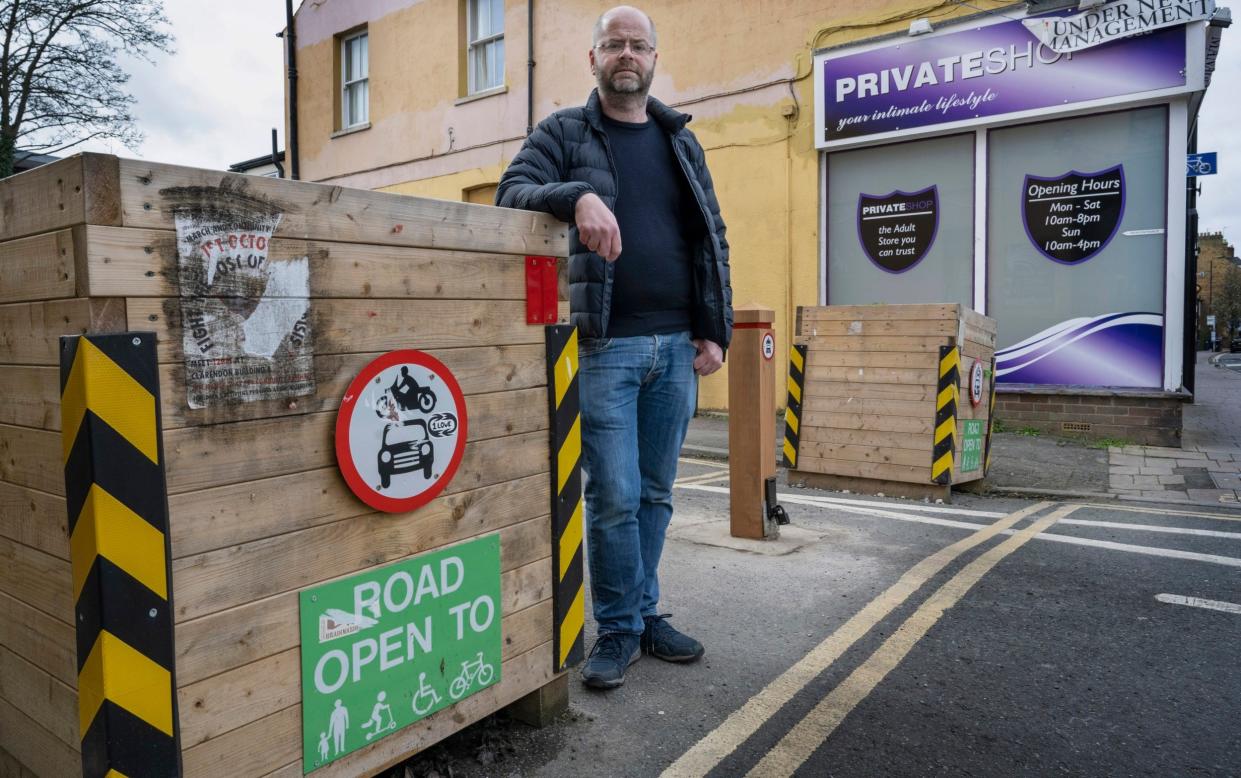Council chiefs ‘covered up’ data that could put climate zones ‘into jeopardy’

Oxford council chiefs “covered up” data that risked “jeopardising” its controversial climate zones, which will ban residents from travelling directly between suburbs, The Telegraph can disclose.
Six traffic filters, described as “bus gates”, will close off arterial roads to cars in an attempt to relieve congestion and promote cycling in a trial starting next year.
Local drivers will be given 100-day annual permits to cross the boundaries – or 25-day permits if they live outside the city – and fined £70 on other days unless they take a detour onto the ring road, with buses, HGVs, cyclists and blue-badge holders exempt.
However, Oxfordshire County Council has been accused of “hiding crucial figures” from residents, which show its scheme could increase traffic.
Tory councillors are demanding that the Labour-Lib Dem-Green coalition returns to the drawing board, criticising it for “acting like masters” who “railroad through” climate ideas in a “democracy-free zone”.
Amid rising opposition in the city, Liz Leffman, the council leader, has called critics “conspiracy theorists”. Police have been called in, while thousands have signed petitions against the zones.
At least 3,500 people took part in the council consultation between Sep 5 and Oct 9 last year, but could not state simply whether they agreed or disagreed with the proposals.
The council provided a summary report during the official survey, which said modelling estimates show the scheme “will reduce traffic flows by around around 20 per cent within the city inside the ring road, and around 35 per cent in the city centre” but “increase total traffic flows by around three per cent on the ring road”.
The claims were based on the modelling data, but the council refused to publish it in full until the consultation had closed desspite having received it a month before the survey opened.
The full results, obtained by The Telegrpah, show that traffic will increase in eight of 19 locations modelled, and its speed will stay the same or decrease in all but one of these areas – some of which are already controversial low-traffic neighbourhoods (LTNs).
In the worst cases, traffic is forecast to increase on the arterial A4144 Woodstock Road by 62.4 per cent in the morning rush hour, while the “bus gate” on Marston Ferry Road will not improve bus journey times. Traffic is also set to increase by an average of 10 per cent on Botley Road during the week.
The council also promised the Department for Transport that it would approve the filters six months before the public survey even began to clinch £32.8 million of government funding towards new electric buses.
The Telegraph has obtained email chains between council officers in which staff admitted the data could put the scheme “into jeopardy”, so “we should stick to our guns” and not publish it until the consultation closed.
Staff said the council had “taken legal advice” backing its decision to withhold the data, but when asked for this via Freedom of Information laws, the authority claimed it “was provided verbally in meetings where no minutes were taken”. Other exchanges discuss how the modelling data “lit up Twitter”.
The “deplorable” revelations have thrown the scheme into doubt, with Conservative councillors bringing a motion next week to re-run the consultation and find the true scale of opposition.
Cllr Eddie Reeves, the leader of the Tory opposition, said Oxford was now “a troublingly democracy-free zone” and he was concerned that the council cabinet’s emergency approval of the restrictions in November “no longer commands public support”.
He told The Telegraph: “Decisions affecting thousands of residents and businesses across Oxfordshire are now seemingly railroaded through by Left-wing councillors following dubious public consultations that are either ignored or skewed to deliver their desired result.
“In Oxfordshire, a car is no longer a car. It is a ‘private vehicle’, a policy problem to be solved through restrictions that make driving freely virtually impossible. The Cabinet must explain this worrying chain of events as a matter of urgency.”

Cllr Liam Walker, a Tory member of the county council, said: “It’s a cover-up – they are acting like masters. They need to come clean and right their wrongs by re-running the sham consultation, which has misled people. The council leaders are absolutely desperate, and are clearly in panic mode.”
Richard Parnham, an Oxford resident who has “dragged information out of the council” via Freedom of Information, told The Telegraph: “Ideally, the council should scrap the entire scheme... and quite frankly any officers who actively decided not to release the information should be questioning their own conduct.”
Concerned Oxford Residents, a campaign group, said: “Residents will rightly find it deplorable, and in particular, Summertown residents would be right to be incensed, that the council hid data showing their policy would cause new congestion in their neighbourhood.
“We would raise questions about whether the findings cast doubt on the council’s legitimacy to govern as a democratic institution.”
An Oxfordshire County Council spokesman claimed the data withheld was not “vital” and said “too much technical detail can reduce response rates”.
The spokesman said the more detailed report published after the consultation “provided further detail but it did not alter the overall conclusions set out in the summary provided alongside the survey” and a six-month consultation would open during the trial.
The council said an internal review this month found the information provided was “sufficient and appropriate” and complied with the Gunning Principles of how local councils should engage residents. However, campaigners argued that it was not impartial because it was carried out by the council’s monitoring officer.

 Yahoo News
Yahoo News 
